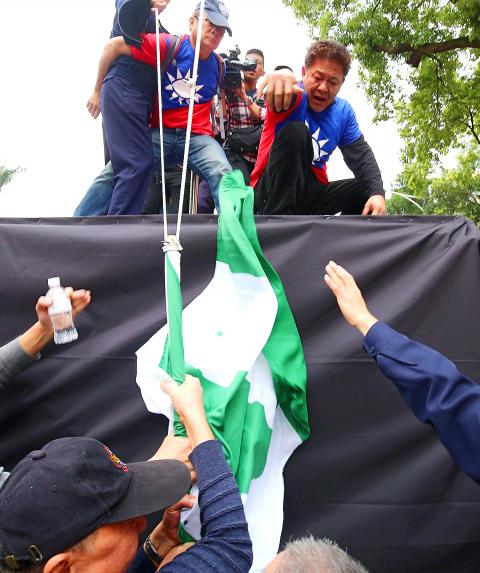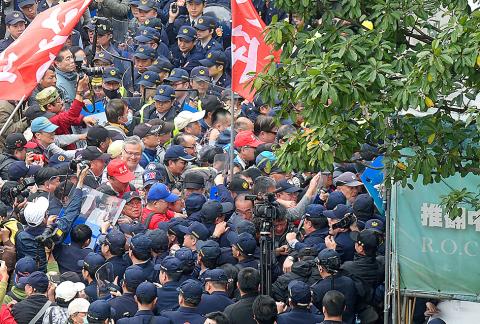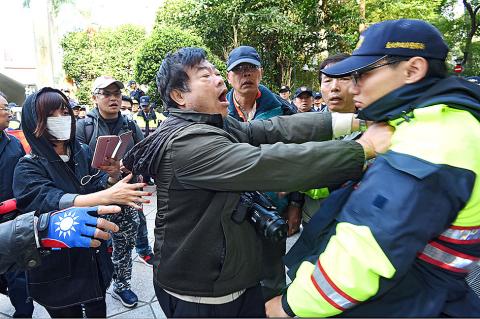Veterans’ group 800 Heroes and other groups opposing pension reform yesterday broke into the Legislative Yuan in Taipei during a protest demanding that the government halt pension reform plans for military personnel, public-school teachers and civil servants.
Protesters at 6am got off a tour bus outside the legislature and immediately began climbing its walls and gates on Zhenjiang Street and Qingdao E Road, Sixth Special Police Corps head Chang Chuan-chung (張傳忠) said.
Although police soon forced protesters out of the compound, they repeatedly attempted to break into the building and continued their protest outside the legislature until late afternoon.

Photo: Huang Yao-cheng, Taipei Times
It was estimated that more than 400 people participated in the protest, while 600 police officers were mobilized to maintain order.
During a clash with the police in the morning, retired lieutenant general and 800 Heroes spokesman Wu Sz-huai (吳斯懷) fell and was sent to a hospital.
“The government has betrayed our trust and broken its promise to us,” Wu said when he returned to the protest a few hours later.

Photo: Huang Yao-cheng, Taipei Times
The government in May last year pledged that it would communicate with veterans before the Ministry of National Defense sent out a draft proposal on pension reform for legislative review, “but now the Executive Yuan is about to pass the draft proposal and there has been no communication at all,” he said.
The legislature should not review the bill until the government has honored its promise to communicate with veterans’ representatives, he added.
The government should halt all pension reform plans and first try to reach a consensus with them, Wu said.

Photo: Liu Hsin-de, Taipei Times
The group is also requesting a constitutional interpretation to clarify the legality of the Pension Reform Committee, as it appears to be unsupervised and unconstitutional, he said.
“What is happening to us will happen to all military personnel in the future. Retired military personnel are treated like disposable chopsticks by the government, with no dignity at all,” he added.
Another 800 Heroes member, retired colonel Miao Te-sheng (繆德生), was hospitalized after he fell from the wall of a legislative building’s third floor at about 7am.
Footage provided by police shows he landed head-first. He was in a coma as of press time last night.
“We are sad that anti-pension groups decided to take such an irrational approach when the draft proposal is still under review at the Executive Yuan,” Chang said.
Before the protest ended at about 5pm, anti-pension reform groups clashed with members of the pro-independence group 908 Taiwan Republic Campaign on Jinan Road and burned their flag.
Chinese Nationalist Party (KMT) Chairman Wu Den-yih (吳敦義), former KMT chairwoman Hung Hsiu-chu (洪秀柱), KMT Vice Chairman Hau Lung-bin (郝龍斌) and former premier Hau Pei-tsun (郝柏村) all stopped by the protest to express their support.
President Tsai Ing-wen (蔡英文) yesterday expressed concern about the injured protesters and called for rational discussion on proposed pension reform.
“The president believes that soldiers are the cornerstone of national security. The government has adopted a clear stance on the matter, that the ongoing pension reform for military officers should factor in the special nature of their work and be designed to encourage their long service and employment,” Presidential Office spokesman Sidney Lin (林鶴明) said.
The government would seek to fix the military pension floor at a reasonable level, within the limits of the nation’s finances, Tsai was quoted as saying.
Additional reporting by Stacy Hsu and CNA

CHAOS: Iranians took to the streets playing celebratory music after reports of Khamenei’s death on Saturday, while mourners also gathered in Tehran yesterday Iranian Supreme Leader Ayatollah Ali Khamenei was killed in a major attack on Iran launched by Israel and the US, throwing the future of the Islamic republic into doubt and raising the risk of regional instability. Iranian state television and the state-run IRNA news agency announced the 86-year-old’s death early yesterday. US President Donald Trump said it gave Iranians their “greatest chance” to “take back” their country. The announcements came after a joint US and Israeli aerial bombardment that targeted Iranian military and governmental sites. Trump said the “heavy and pinpoint bombing” would continue through the week or as long

TRUST: The KMT said it respected the US’ timing and considerations, and hoped it would continue to honor its commitments to helping Taiwan bolster its defenses and deterrence US President Donald Trump is delaying a multibillion-dollar arms sale to Taiwan to ensure his visit to Beijing is successful, a New York Times report said. The weapons sales package has stalled in the US Department of State, the report said, citing US officials it did not identify. The White House has told agencies not to push forward ahead of Trump’s meeting with Chinese President Xi Jinping (習近平), it said. The two last month held a phone call to discuss trade and geopolitical flashpoints ahead of the summit. Xi raised the Taiwan issue and urged the US to handle arms sales to

State-run CPC Corp, Taiwan (CPC, 台灣中油) yesterday said that it had confirmed on Saturday night with its liquefied natural gas (LNG) and crude oil suppliers that shipments are proceeding as scheduled and that domestic supplies remain unaffected. The CPC yesterday announced the gasoline and diesel prices will rise by NT$0.2 and NT$0.4 per liter, respectively, starting Monday, citing Middle East tensions and blizzards in the eastern United States. CPC also iterated it has been reducing the proportion of crude oil imports from the Middle East and diversifying its supply sources in the past few years in response to geopolitical risks, expanding

Pro-democracy media tycoon Jimmy Lai’s (黎智英) fraud conviction and prison sentence were yesterday overturned by a Hong Kong court, in a surprise legal decision that comes soon after Lai was jailed for 20 years on a separate national security charge. Judges Jeremy Poon (潘兆初), Anthea Pang (彭寶琴) and Derek Pang (彭偉昌) said in the judgement that they allowed the appeal from Lai, and another defendant in the case, to proceed, as a lower court judge had “erred.” “The Court of Appeal gave them leave to appeal against their conviction, allowed their appeals, quashed the convictions and set aside the sentences,” the judges